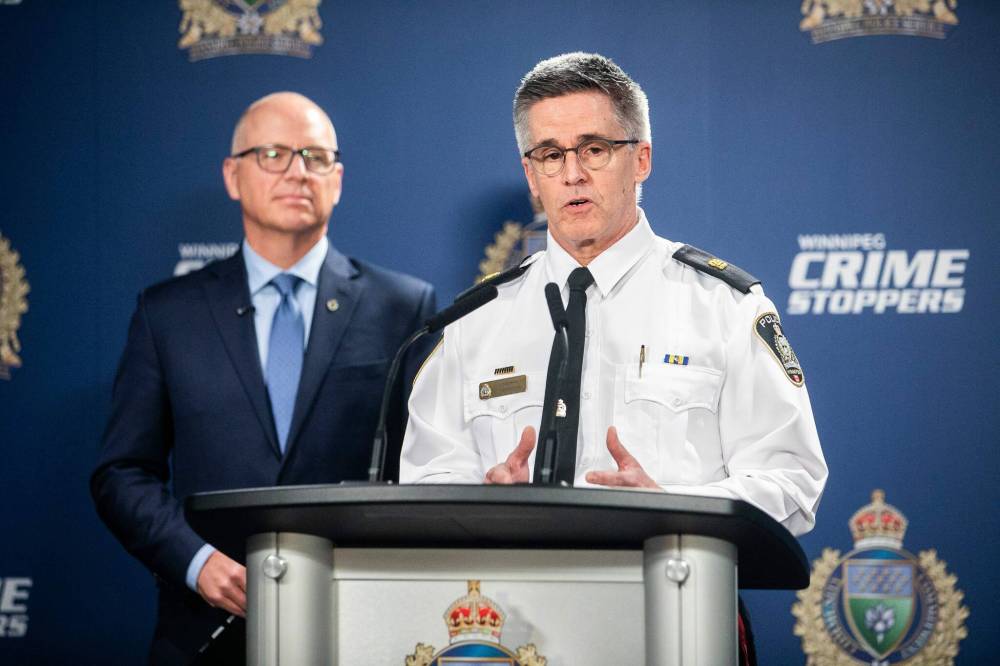WPS ramps up AI non-emergency call response system
Advertisement
Read this article for free:
or
Already have an account? Log in here »
To continue reading, please subscribe:
Monthly Digital Subscription
$0 for the first 4 weeks*
- Enjoy unlimited reading on winnipegfreepress.com
- Read the E-Edition, our digital replica newspaper
- Access News Break, our award-winning app
- Play interactive puzzles
*No charge for 4 weeks then price increases to the regular rate of $19.00 plus GST every four weeks. Offer available to new and qualified returning subscribers only. Cancel any time.
Monthly Digital Subscription
$4.75/week*
- Enjoy unlimited reading on winnipegfreepress.com
- Read the E-Edition, our digital replica newspaper
- Access News Break, our award-winning app
- Play interactive puzzles
*Billed as $19 plus GST every four weeks. Cancel any time.
To continue reading, please subscribe:
Add Free Press access to your Brandon Sun subscription for only an additional
$1 for the first 4 weeks*
*Your next subscription payment will increase by $1.00 and you will be charged $16.99 plus GST for four weeks. After four weeks, your payment will increase to $23.99 plus GST every four weeks.
Read unlimited articles for free today:
or
Already have an account? Log in here »
Non-emergency phone calls to Winnipeg police are soon more likely to be answered by an artificial intelligence voice agent.
A pilot project testing the new technology began nearly a year ago, but initially answered calls just a few hours per week. Beginning Monday, that will increase to a few hours per day.
Insp. Gord Spado said WPS hopes to ramp up the AI service again in a couple of weeks and, if it continues to work well, eventually offer it 24 hours a day to help address high call volumes and reduce wait times.

MIKAELA MACKENZIE / FREE PRESS
Inspector Gord Spado of the WPS communications division, with guest Mayor Scott Gillingham), speaks to the media about AI-powered interactive voice agents for their non-emergency line on Friday.
“Our non-emergency line received about 172,000 calls to date this year. That’s about 900 a day. That doesn’t include the 911 calls that we receive,” said Spado.
“We really want to try to divert as many non-emergency calls as we can while still providing a quality customer service. And that frees up our call-takers to handle the actual emergent calls.”
Spado urged those callers to speak in clear, full sentences, limit background conversations and wait for AI prompts to be completed before replying to help the system provide fast, accurate results.
WPS had previously said the pilot project was initially expected to be fully implemented by June. However, it was delayed after initial tests yielded disappointing results, including missed words and slow responsiveness, which led many calls to be forwarded to human call-takers.
At the time, police said a more recent test had produced much better results, with 58 of 60 calls handled entirely by AI.
Police have noted the AI system will not take 911 calls, which will continue to be directed to a human operator.
The system is expected to help reduce staff workload but not the number of staff taking police calls, said Spado. “We’ve got so much demand for staff right now, we’re actually recruiting more. There’s no intention to reduce staffing right now.”
The AI system would replace WPS’s current voice-response program for non-emergency calls, which prompts callers to press buttons to help direct their inquiries. The new automated, more conversational system will be able to ask and respond to questions instead.
The project is one of six AI-driven pilot projects the City of Winnipeg started in 2024.
“This is about delivering good customer service to the people of Winnipeg and making a heavy workload a little more manageable for front-line staff,” said Mayor Scott Gillingham.
The system is currently limited to English, but it is possible to expand to other languages, said Spado.
Police hope to decide if the pilot project will become permanent by the end of this year.
joyanne.pursaga@freepress.mb.ca
X: @joyanne_pursaga

Joyanne is city hall reporter for the Winnipeg Free Press. A reporter since 2004, she began covering politics exclusively in 2012, writing on city hall and the Manitoba Legislature for the Winnipeg Sun before joining the Free Press in early 2020. Read more about Joyanne.
Every piece of reporting Joyanne produces is reviewed by an editing team before it is posted online or published in print — part of the Free Press‘s tradition, since 1872, of producing reliable independent journalism. Read more about Free Press’s history and mandate, and learn how our newsroom operates.
Our newsroom depends on a growing audience of readers to power our journalism. If you are not a paid reader, please consider becoming a subscriber.
Our newsroom depends on its audience of readers to power our journalism. Thank you for your support.



